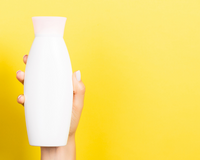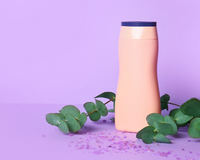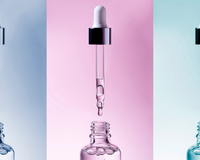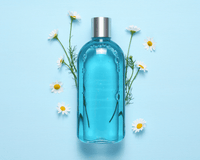How to Care for Natural Hair Daily?
Hair is the frame of beauty, emphasizing it or hiding the flaws in appearance if necessary. Therefore, hair needs daily care and maintenance. It is essential to understand that you need to be consistent for hair care like any other part of the body. You cannot nourish your hair for around a month or a little more and then forget about it, hoping that it will be healthy for the rest of your life. Be consistent and care for your hair. Also, during life, the state of our hair, as a result of the body's condition, changes depending on the hormonal background, from concomitant diseases, from the environment, and other things.
Determine Your Hair Type
For competent and effective hair care, it is essential to correctly determine your hair type, as otherwise there is a risk of worsening their condition. Hair is divided into standard, dry, oily, and mixed.
- Normal hair - elastic, moderately thin, not too dry and not very oily, scalp without dandruff, with a slight combing, up to 50 hairs fall out.
- Dry hair - thinner, fluffier, brittle.
- Oily hair is thicker than normal hair, rich in grease, more elastic, and absorbs less water.
- There are transitional forms between the main hair types: moderately or dehydrated, moderately or excessively oily.
Obligatory care includes cleansing and daily brushing.
Of the whole spectrum of hair care treatments, washing is an essential component as it serves both hygienic and cosmetic purposes. For healthy hair, not damaged or depleted, correct and timely washing is the minimum sufficient care procedure.
Advantages of Shampoo
Today, the most important fighter for the cleanliness and health of hair is hair care shampoo. You need to choose a shampoo that's right for your type.
The positive results of using the shampoo can be considered the shine of the hair after it dries, clean hair, the absence of fat on it, good combability and obedience, and the absence of scalp irritation. To understand that this shampoo is not correct for you, one or two use is enough, but to conclude that this shampoo is just for you, you need to use it regularly for at least several weeks. Also, a high-quality shampoo should remove static electricity from the hair, and most importantly, replace the loss of protein, moisture, and nutrients.
After using the shampoo, it is a recommendation to apply a conditioner to your hair. They can be washable or indelible. The conditioner smoothes, eliminates static electricity, makes combing easier. The conditioner should only be added to the hair, avoiding the roots and scalp.
The rinse and hair care conditioners have several functions: they make it easier to dry and comb out and give the hair elasticity. It is best if you use the same brand of shampoo and rinse - they correspond to each other in composition, and the action of the rinse complements the action of the shampoo as effectively as possible.
To restore damaged hair, unique means for express treatment are intended - they "smooth." This means they have a regenerating and nourishing effect on the hair follicle. And they have a design that helps with quick and easy regenerating action. For a longer, complete, and deep healing effect, there are masks. You can apply them to the hair for 15-20 minutes 1-2 times a week.
Shampoo Facts
|
Throughout life, 20-30 hairs can grow from each follicle. Each new hair can grow for 2-7 years and reach more than one meter in length before it enters the "resting" stage, which lasts three months. With age, a person tends to decrease hair growth activity, and the hair itself becomes shorter. |
Types of Shampoo
Shampoos for normal hair should be soft and gentle. A light hygiene product that is not overloaded with nutrients is suitable for washing. It gently cleanses and does not dry the skin. If the hair is of the normal type, not dyed or bleached, you can fearlessly use "universal" shampoos, which have an average effect.
Shampoos for fine hair
These hair care shampoos are often called voluminous. Detergents contain, in addition to mild detergents, elements that strengthen the hair (for example, keratin, protein, or herbal extracts). They contribute to the formation of light, rough film, create volume, and maintain the hairstyle. Proteins and some urea compounds strengthen the hair shaft, making it stiffer. Accordingly, shampoos that add volume and contain proteins are suitable for fine hair. Thanks to these substances, the hair does not stick together so quickly.
Shampoos for oily hair
You can wash oily hair with acidic shampoos containing, for example, cedar nut oil. Detergents for oily hair contain a minimum of nutrients and do not contain any fatty additives. Moreover, antimicrobial and tannins are often introduced into such shampoos, which give the hair a "combing" roughness. They are incorporated into the shampoo to normalize oil production and prevent hair from sticking shortly after washing.
Shampoos for dry and split ends
For owners of dry hair, special shampoos for this type are suitable; they usually contain many fat additives and moisturizers. These formulations have supplies of lanolin or lecithin and also contain synthetic adhesives that give elasticity and smoothness. If your hair is thin or oily at the roots but splits at the ends, it is better not to buy hair care conditioner shampoos. Nutritional supplements can be very stressful and will stick together quickly. In this case, it is best if you use special shampoos for oily hair and, if possible, to carry out a course of treatment.
You can rub shampoos for dry hair vigorously into the scalp to restore normal sebum production. Before washing, make partings on the head with a comb and cover the skin with a thin shampoo layer. Use the fingertips of both hands to massage the skin vigorously, rubbing shampoo into it. For the product to be better and faster absorption into the skin, it is necessary to tie a heated towel over your head. After a while, you can apply shampoo again, and the hair is clean.
Hair Rinsing
How often do you use the rinse aid after washing depends on the hair care condition of the hair and the preparation. Conventional preparations have enough strength from washing to washing. But there are products with stronger effects, such as silicones and polymers. They are introduced into rinses for severely split ends. If, after the systematic use of this drug, they become lethargic and heavy, you need to wash your hair several times without rinsing.









